Recent Fire Damage Posts
Smoke Damage Cleanup After Lacey Wildfire
4/28/2025 (Permalink)
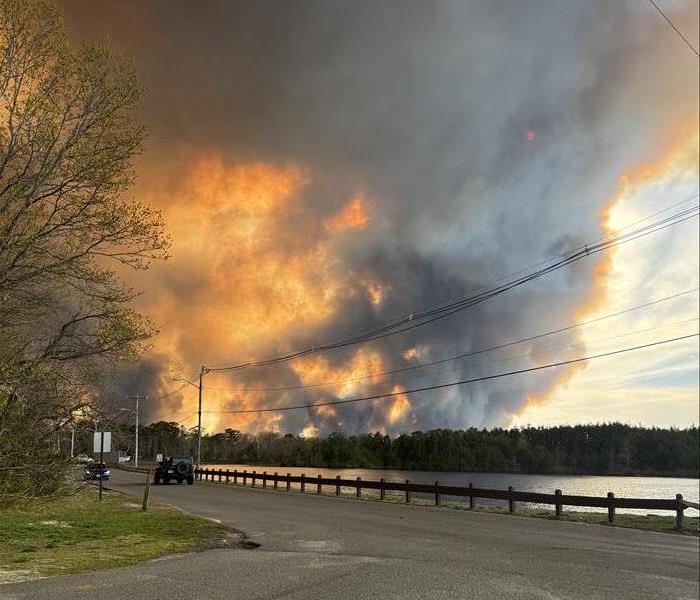 Need smoke damage cleanup? Call SERVPRO of Jackson/Lacey today at (732) 523-4986.
Need smoke damage cleanup? Call SERVPRO of Jackson/Lacey today at (732) 523-4986.
Smoke Cleanup After Lacey’s Wildfire
Wildfires can be devastating and not just for forests and fields, but for homes and businesses caught in their path. Even if a property isn't destroyed, smoke, soot, and ash can cause significant damage that’s dangerous and difficult to clean on your own. If your Lacey property has been impacted by wildfire smoke damage, SERVPRO of Jackson/Lacey is your trusted partner for fast, professional cleanup and restoration services.
How Wildfire Smoke Damage Your Property
Smoke and ash can infiltrate a property even if flames never touch it. Tiny particles seep into walls, ceilings, HVAC systems, furniture, and personal belongings, leaving behind strong odors, stains, and potential health hazards. Soot and ash are highly acidic and can cause permanent damage to surfaces if not cleaned quickly and properly.
In addition to the obvious black residue, smoke can leave behind invisible threats. Air quality may be compromised long after the fire is out, and hidden contamination in ventilation systems can continue to circulate particles throughout the home or building.
Immediate Action Is Critical
The longer smoke and soot remain in your property, the harder it is to remove the odors and stains. Acting quickly helps to:
- Prevent permanent staining of walls, ceilings, and floors
- Minimize long-term structural damage
- Improve indoor air quality
- Save more of your personal belongings and valuables
That’s why contacting professional cleanup services like SERVPRO of Jackson/Lacey immediately after a wildfire is so important.
At SERVPRO of Jackson/Lacey, we understand the stress and uncertainty that come with fire and smoke damage. Our highly trained technicians are ready 24/7 to restore your home or business with expert care.
Our Fire and Smoke Cleanup Services Include:
- Emergency Response and Inspection: We respond quickly to assess the damage and develop a customized cleanup plan.
- Soot and Ash Removal: Using specialized equipment and techniques, we remove ash, soot, and other residues from surfaces, HVAC systems, and hard-to-reach areas.
- Deep Cleaning and Sanitization: We clean and sanitize walls, ceilings, floors, and belongings affected by smoke damage.
- Odor Elimination: Our advanced deodorization techniques and equipment target and eliminate smoke odors at the source.
- Content Restoration: We work to clean and restore your valuable items, from clothing to important documents and electronics.
- Reconstruction Services: If your property needs repairs, we can provide comprehensive reconstruction services to restore it to preloss condition.
Why Choose SERVPRO of Jackson/Lacey?
- We are locally owned and operated with a strong commitment to our community
- Certified in fire and smoke damage restoration
- Equipped with the latest tools and techniques for effective cleanup
- Work directly with your insurance company for a smoother claims process
At SERVPRO of Jackson/Lacey, we’re committed to helping you rebuild, recover, and move forward. If your property has suffered fire or smoke damage from a wildfire, call us today at (732) 523-4986. We’re ready to respond 24 hours a day, 7 days a week.
Wildfire Content Cleaning Services by SERVPRO of Jackson/Lacey
12/9/2024 (Permalink)
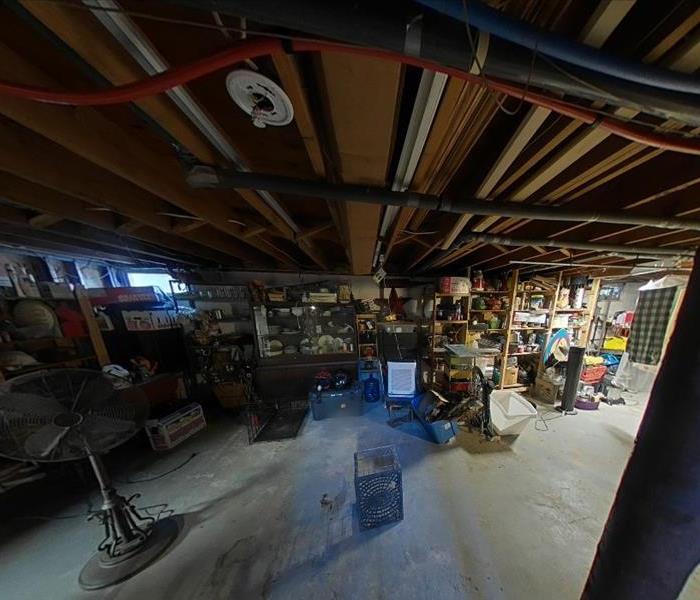 Our highly trained technicians provide fast, efficient, and compassionate service, helping you recover from wildfire damage as quickly as possible.
Our highly trained technicians provide fast, efficient, and compassionate service, helping you recover from wildfire damage as quickly as possible.
Wildfires are devastating events that leave behind a trail of destruction, including smoke, soot, and ash. Even if your home or business isn’t directly damaged by flames, smoke and soot can infiltrate every corner of your property, causing significant damage to belongings and posing health risks. SERVPRO of Jackson/Lacey specializes in wildfire content cleaning services to help restore your personal items and peace of mind.
The Hidden Damage of Wildfires
When wildfires occur, the heat, smoke, and airborne particles spread far beyond the burn zone. This can result in:
- Smoke and Soot Damage: Lingering residues can stain furniture, walls, and personal belongings, while also creating persistent odors.
- Corrosion and Degradation: Soot particles are acidic and can corrode metals, electronics, and other materials if not properly cleaned.
SERVPRO’s Wildfire Content Cleaning Process
At SERVPRO of Jackson/Lacey, we use advanced techniques and equipment to clean and restore your belongings, ensuring they are safe and usable again. Our process includes:
- Content Assessment: Our team inspects items to determine the extent of damage and salvageability.
- Soot and Smoke Removal: Using specialized cleaning agents and tools, we remove soot from furniture, textiles, electronics, and more.
- Deodorization: We eliminate smoke odors using techniques like ozone treatments and thermal fogging.
- Storage Solutions: If repairs are needed, we can pack, clean, and store your items safely until your property is fully restored.
Contact SERVPRO of Jackson/Lacey today for expert wildfire content cleaning services
Don’t Let a Clogged Dryer Vent Spark a Fire
10/1/2024 (Permalink)
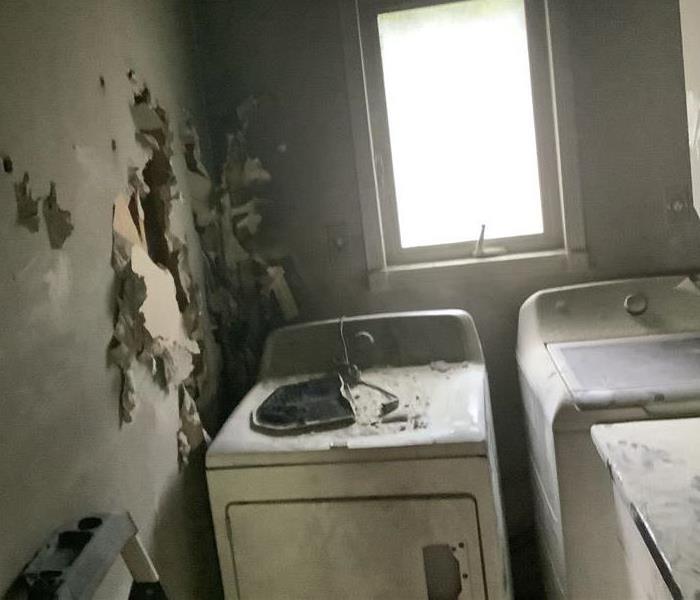 In the event your dryer catches fire, once it is safely put out, SERVPRO of Jackson/Lacey will provide Fire Damage Restoration & Cleanup Services
In the event your dryer catches fire, once it is safely put out, SERVPRO of Jackson/Lacey will provide Fire Damage Restoration & Cleanup Services
When it comes to household safety, we often think about the obvious hazards- like leaving the stove on or forgetting to turn off the iron. However, one of the most significant risks lurking in our Jackson, NJ homes is often overlooked: a clogged dryer vent. While it may seem like a minor inconvenience, a blocked vent can lead to severe consequences, including devastating fire damage.
According to fire safety experts, thousands of dryer-related fires occurs each year, many due to neglected vent maintenance. Don’t let complacency put your home and loved ones at risk. Here is a list of signs from Mountain Man Fireplace & Chimney that your vents may be clogged:
- It’s taking your clothes longer than once cycle to completely dry
- The exterior of the dryer or the clothes are too hot to touch after use
- You notice a musty odor on the clothes or inside of the dryer
- More lint is being accumulated in the lint trap each load.
- You seen lint or other debris around dryer vent openings
Recognizing the signs of a clogged dryer vent is crucial for maintaining both the efficiency of your appliance and the safety of your home. Regular maintenance and cleaning of your dryer vent not only prevent potential fire damage but also improve the overall performance of your dryer, saving you time and energy costs in the long run.
If you ever experience a fire in your home from a clogged dryer vent, SERVPRO of Jackson/Lacey is Here to Help®.
Protecting Your Manchester Home from Halloween Fires
9/25/2024 (Permalink)
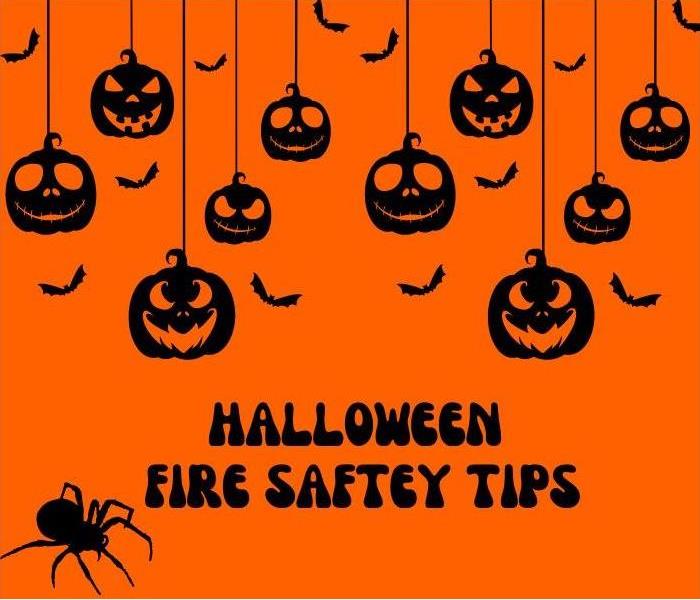 Always keep costumes and decorations away from open flames and use battery-operated candles to avoid fire hazards.
Always keep costumes and decorations away from open flames and use battery-operated candles to avoid fire hazards.
As the Halloween season quickly approaches us, it brings along a display of spooky and creative decorations. Amidst the excitement and festivity, it’s important to be aware of potential fire damage hazards as well. According to NFPA.org “From 2015–2019 there was an average of 790 home structure fires that began with decorations per year. These fires caused an annual average of one civilian fire death, 26 civilian fire injuries, and $13 million in direct property damage. More than two of every five (44%) of these fires occurred
because the decorations were too close to a heat source, such as a candle or hot equipment. More than one-third (35%) of these fires were started by candles”. It’s always better to play it on the safe side. By taking a few small safety tips provided by travelers into consideration while you
decorate your Manchester home, you can keep yourself and your family safe this Halloween.
Safety Tips:
- Make sure to not overload your electrical outlets when plugging in your decorations, indoors and out.
- Avoid any type of open flame, instead opt for battery-operated candles or LED lighting.
- Drapping costumes or fabrics over light bulbs can generate heat and cause fire damage to your home.
- Avoid dried flowers, cornstalks, and crepe paper because they are highly flammable. Keep these and all
other decorations away from open flames and heat sources, like light bulbs and heaters. - When purchasing electrical decorations make sure to check if they have been tested by a recognized
laboratory for safety. - Try not to daisy chain extension cords together, it may cause overheating.
- Do not staple, nail through, or fasten electrical wires/cords that could damage the wire or insulation.
By being mindful and taking a few precautionary measures you can ensure that your Halloween celebrations remain both spooky and safe. SERVPRO of Jackson/Lacey is here to help you have a memorable and fire-free Halloween! If you have any questions or are in need of our services, do not hesitate to give us a call 732-523-4986.
Say Goodbye to Soot
9/11/2023 (Permalink)
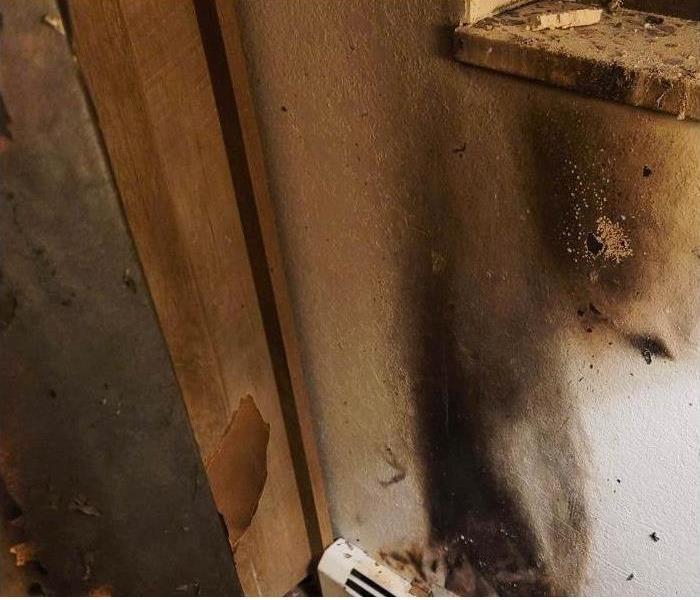 Our fire damage resources give you all the information you need about fire damage restoration and soot damage cleanup.
Our fire damage resources give you all the information you need about fire damage restoration and soot damage cleanup.
Are you feeling overwhelmed by the aftermath of soot damage in your Plumsted home? Whether you’ve experienced a small kitchen fire or a larger-scale incident, SERVPRO of Jackson,
Lacey knows firsthand the importance of restoring your home to its former glory. Soot can cling to stubborn surfaces, leaving behind residue and a lingering odor that seems to get in every nook and cranny. So how do the seasoned experts tackle soot cleanup? SERVPRO breaks it down for us in four simple steps:
- Fire Damage Inspection-Emergency services are always the first on the scene. After they consider the property safe to enter, our
soot-cleaning professionals come in to do an inspection of the damage. - General Cleanup-Boarding up and tarp services, general clean up, and water removal/drying are all done prior to the soot
cleanup. - Soot Cleanup-Specialized equipment is used to remove soot surfaces from the affected areas of your home. Each type of surface requires a different technique. Size and severity play a huge part in the cleanup process. A cleanup may have all four types of soot damage, or it may just have one. Dry smoke, wet smoke, protein residue, and petroleum residue are the types of soot damage that could be present.
- Odor Removal-Depending on the type of material that caught fire you might have lingering odors. The process for eliminating those odors is source removal, cleaning, and then deodorizing. However, if the case is more extreme the exposed surfaces might be sealed.
Dealing with soot cleanup can be a challenging task, that’s why it’s best to leave it up to our experts here at SERVPRO of Jackson, Lacey.
Closing Your Bedroom Door at Night Can Save Your Life During a Fire
4/10/2023 (Permalink)
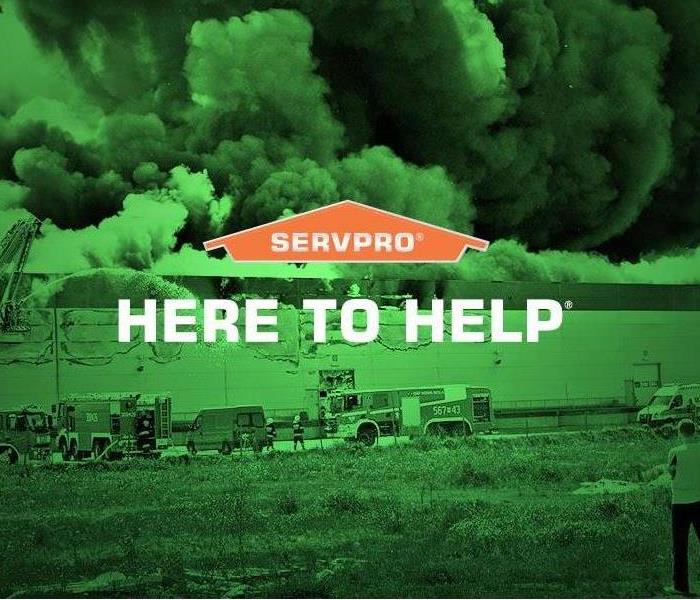 The New Egypt community can be sure that SERVPRO of Jackson/Lacey has the training and experience to help you recover quickly from fire damage.
The New Egypt community can be sure that SERVPRO of Jackson/Lacey has the training and experience to help you recover quickly from fire damage.
There are many dangerous things you are vulnerable to while you are asleep, such as fires. Closing your bedroom door at night significantly increases your chance to survive an unexpected house fire. It also helps prevents the spread of fire damage that will occur to your New Egypt home. Fire feeds off of oxygen and when a door is open it provides a source of air that basically acts as a pump. When you close the door it cuts off the pump and restricts the fire of fuel. It can provide an effective barrier to prevent the spread of flames and smoke. Since you are less reactive when you are sleeping, it’s vital to take this small step. Fire doors and their frames typically hold back a fire for 30 minutes to 60 minutes.
According to The Family Handyman, “Forty years ago, the average time to escape a house fire was 17 minutes. Now, with most furniture, fabrics and even construction products made from synthetic materials, it’s down to three minutes.” So if your bedroom door is kept closed at night, it is much safer for yourself, your family and your property.
If you are in need of a fire restoration company SERVPRO of Jackson/Lacey is here to help. We are available 24 hours a day, 7 days a week and we’ll make a devastating event “Like it never even happened”. Call us today at 732-523-4986.
Kitchen Cleaning After a Fire in Whiting
3/28/2023 (Permalink)
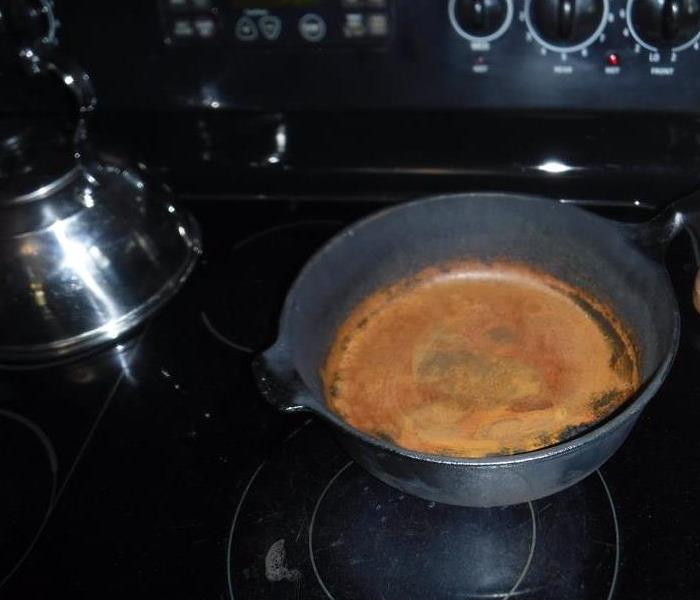 Grease fire in a Whiting kitchen brought soot and smoke damage throughout a two story home.
Grease fire in a Whiting kitchen brought soot and smoke damage throughout a two story home.
Cooking is such a routine activity that it is easy to forget that the high temperatures used can easily
start a fire. More fires start in the kitchen than in any other place in the home. Two of every five
home fires start in the kitchen while food is cooking. Luckily, the majority of reported cooking fires were small.
Do Electric or Gas Stoves Cause More Kitchen Fires?
Households that used electric ranges showed a higher risk of cooking fires and associated losses
than those using gas ranges, according to the National Fire Prevention Agency. This could be because with an electric range it may be less
obvious that a burner is still on.
Do You Know That Oil and Grease Could Start a Kitchen Fire?
Grease fires happen when oil, grease, or fat on a stovetop or oven get hot enough to ignite. They
are highly flammable which means they can catch fire easily. Different oils burn at different
temperatures or flash points, but
every oil you can buy at the grocery store is capable of catching on fire if the temperature is high enough. When you are cooking with grease, it is important to know the warning signs that oils are getting too hot. Boiling and smoking are good indicators that it is time to turn down the heat. Oils heat very quickly, and once it starts to smoke, oil can catch fire in as little as 30 seconds.
Do You Know That Water Makes Grease Fires Worse?
NEVER try to extinguish a grease fire with water. Throwing water on the fire can cause burning
grease to splash, which can make the fire spread and potentially harm bystanders. It is dangerous to move a pan or pot of burning oil for the same reasons, according to VeryWellHealth.com.
Grease Fires Can Get Out of Control Quickly.
Do not wait until the fire is out of control to call 911! The fire department can always return to the
station if you are able to get the fire out before they get to you.
What to Do If You Experience an Oil or Grease Fire:
- Call 911-Fires can become out of control very quickly.
- Turn off the Stove-Whether it is the burner, oven, or broiler turn it all off.
- Cover with a Lid-The easiest way to cut off oxygen to a grease fire is to cover it with a metal pan lid or baking sheet.
- Douse the Flames-The warning to never use water to put out a grease fire is worth
repeating, especially since your urge may be to take a burning pot to the sink and turn on the faucet. Instead, you can reach for two pantry staples to help douse a small grease fire safely with baking soda
because it releases carbon dioxide when heated, which can smother the fire or salt
can form a barrier between the fire and the air. This prevents the fire from getting the oxygen it needs. NEVER use flour and baking powder as they are highly
combustible and can explode in extreme heat. Do not use them (or any boxed mixes that contain them) on a grease fire. - Use a Class K Fire Extinguisher. These are wet chemical extinguishers that are commonly found in commercial kitchens. They are designed specifically for cooking fires and work by forming a soapy foam on the surface of the fire that cuts off air flow. NEVER use a Class A-only fire extinguisher on a grease fire, as it is water-based.
When Should You Call the Pros at SERVPRO of Jackson/Lacey to Clean After a Grease Fire?
Because grease fires cause such extensive damage and be a long, intensive process, it is almost always advisable to call in professionals. SERVPRO of Jackson/Lacey have the specialized fire restoration training needed to restore your home to pre-fire condition.
Is My Air Conditioner Unit a Potential Fire Hazard?
3/22/2023 (Permalink)
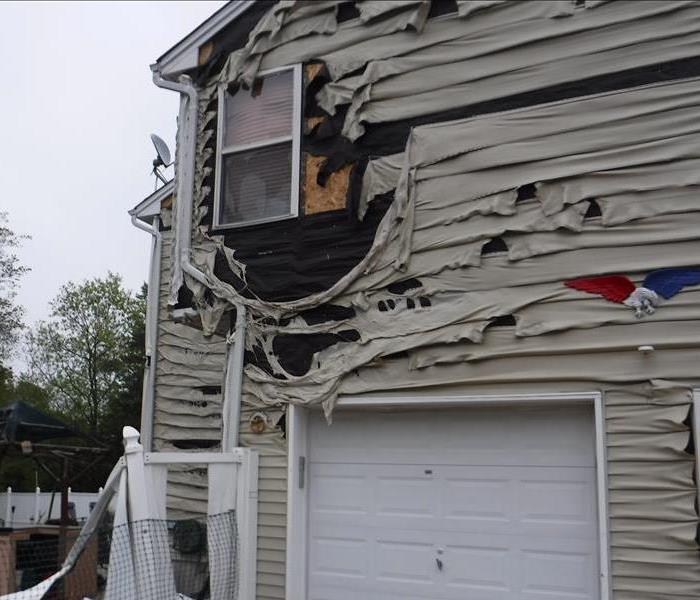 SERVPRO of Jackson/Lacey offers fire damage cleanup and restoration in Forked River, NJ from an air conditioner unit fire.
SERVPRO of Jackson/Lacey offers fire damage cleanup and restoration in Forked River, NJ from an air conditioner unit fire.
Over the summer, a Forked River
resident's air conditioning (AC) unit caught fire. The unit had an electrical fire and burned within itself, filling the house with a haze. According to National Fire Protection Agency, 7,400 fires were reported across the United Sates resulting from faulty air conditioning systems. A large amount of Air conditioner fires happened from overheating or some type of electrical issue.
CBS has some helpful tips on preventing an air conditioner fire from occurring in your home:
- Maintenance Once or Twice a Year:
Not having the proper maintenance done on your unit is a potential fire hazard. Overtime the pieces in your system will start failing, making your air conditioner overwork. Dirt can also obstruct the airflow which can lead to a fire. It is recommended to have at least one visit a year, but if you want to be on the safer side, two is plenty. - Professional Installation:
A professional knows where to place all the wiring and can make sure in the event of a fire, that it won’t ignite inside your home. - Be Cautious of Outside Elements and Wiring:
A professional will be able to assess the space prior to installation to make sure there is nonflammable objects surrounding the area. Never use an extension cord to power the unit. In the event your unit over heats, sparks can produce from the cord. Also, make sure your unit is in a safe place. - Always Make Sure the Unit Is Clean:
If you have a dirty filter, the waste can restrict Airflow. If you want to clean it yourself, just make sure the system is unplugged. - Don’t Leave It On All Day:
If you leave your unit on throughout the day, it could cause overheating. - Know When to Replace Your Unit:You need to keep track of how old your air conditioner is ask a professional who can give you a complete evaluation of your air conditioner state.
If your property experiences smoke or fire damage from your air conditioning unit, SERVPRO of Jackson/Lacey is here to help. We have the top professionals in the industry and we are ready to make it “Like it never even happened.” Call us today 732-523-4986.
Fire Prevention for Your Jackson Restaurant
3/2/2023 (Permalink)
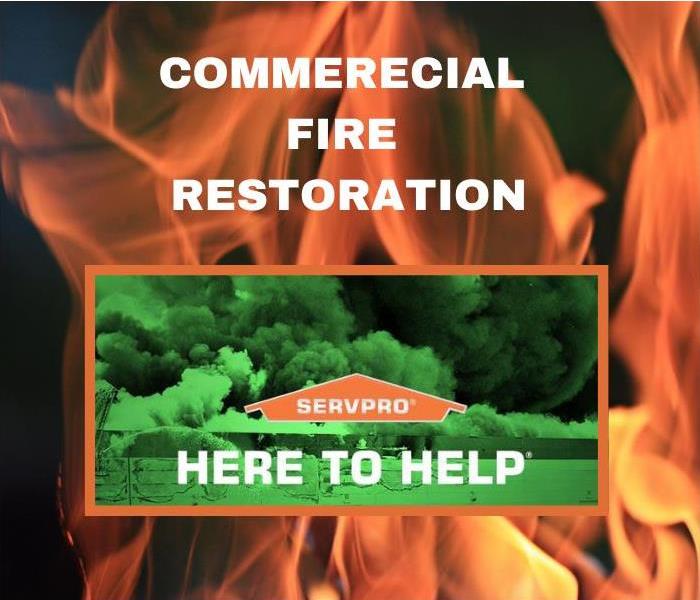 Commercial Fire Damage? Call Us Today – (732) 523-4986!
Commercial Fire Damage? Call Us Today – (732) 523-4986!
Understanding fire hazards in your Jackson
restaurant kitchen can help minimize the risk of can help prevent injury or loss of life, property damage and business shutdown which could cause a loss of revenue.
Do you know the most common causes of restaurant fires?
- Open flames are a risk because many things within the kitchen can catch fire from them.
The staff should be experienced in controlling open flames and know how a fire suppression system works in the event a fire were to start. An automatic fire suppression system is a system in the kitchen is one of the best preventative measures available. According to NFPA,
more than half of restaurant fires involve cooking equipment. Fire suppression systems automatically release fire retardant materials when triggered. Once activated, the system automatically shuts off the fuel or energy supply to the cooking system. - Grease and grease traps Grease can get hot and is extremely flammable. A full grease trap that is not cleaned regularly may have pieces of food that can easily catch fire when more hot grease is added.
- Flammable materials such as loose fitting or flammable clothing, dish towels and pot
holders Make sure everyone in the kitchen has safe and proper attire while in the cooking areas. Also, make sure to keep all dish towels and pot holders away from an open flame. - Electrical wiring Just a small tear, fray or cut in a wire can lead to a fire in your kitchen so remember to check for frays, breaks, or damage, even those that are out of sight.
- Smoking If the staff is allowed to smoke, ensure they have a designated smoking area with disposal bins that are regularly checked and cleaned out.
Remember: The best defense against fire loss is to minimize the risk before a fire breaks out. One of the most accessible strategies for fire prevention involves good housekeeping
What Can Owners, Managers and Employees Do to Help Prevent a Restaurant Fire?
- Train employees on fire extinguisher use/fire submission Train all employees how to properly use a fire extinguisher and activate the overhead fire suppression system, so in the event of a fire, they will know what to do.
- Back up extinguishers: Install back up extinguishers in your restaurant. Extinguishers in the cooking area should be Class K for use on high-temperature grease fires. Use them only after the built-in suppression system is activated. Use Class ABC extinguishers in other areas of the restaurant to deal with fires resulting from other materials such as electrical issues, paper, plastic, or wood. Fire extinguishers are helpful only when staff is trained on their proper use. Staff should know where the extinguishers are located and exactly how to operate one.
- Empty grease traps regularly Overfilled grease traps can catch fire.
- Keep aisles uncluttered Cluttered walkways will hamper employees and customers trying to escape from a fire.
- Turn off gas and electric source Employees should know where and how to cut off the gas and electrical source in case of an emergency ONLY IF SAFE!
- Provide sufficient lighting/make sure exit signs are functioning The emergency exit route needs to be adequately lit so employees and customers can see where they are going in case of an emergency and allows everyone to quickly identify the exit in an emergency.
During a four-year study by the National Fire Protection Association (NFPA), there were 7,640 structural fires in dining and drinking establishments. These fires caused more than $246 million in property damage. The best strategy to protect your restaurant from a fire loss includes fire prevention and proper
training for employees.
If your Jackson restaurant experiences fire damage, SERVPRO of Jackson/Lacey has the training, experience, and equipment to handle large commercial fire damage emergencies. Whether your fire emergency occurs in a restaurant, motel, or office building, we will respond quickly to mitigate the damage and manage the restoration project through to its completion.
Heating Safety Tips for the Cold Months in New Jersey
1/18/2023 (Permalink)
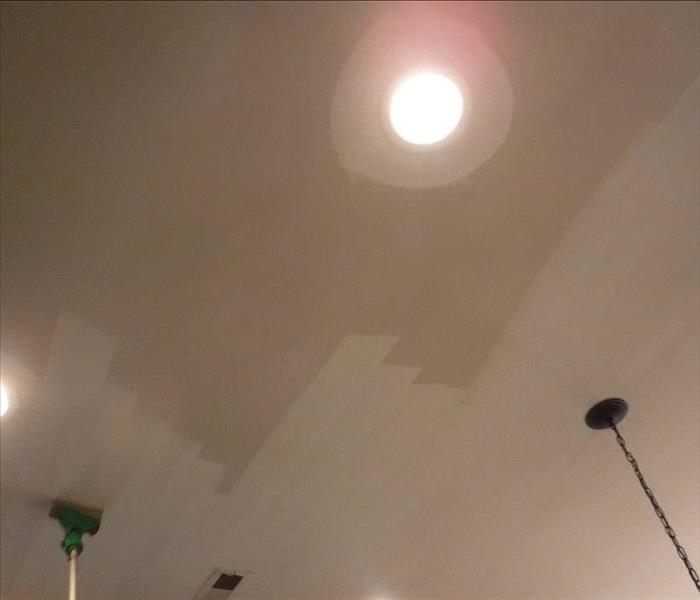 This ceiling is in the process of having fire, smoke and soot damaged removed by SERVPRO of Jackson/Lacey.
This ceiling is in the process of having fire, smoke and soot damaged removed by SERVPRO of Jackson/Lacey.
Winter has been relatively kind to us this January 2023 but we still have lots more winter ahead of us. In an effort to keep warm and keep costs down, people sometimes resort to using alternate forms of heating, such as fire places and space heaters.
According to the National Fire Protection Association, heating is the lead cause of home fire deaths during the months of December, January and February. Based on 2016-2020, space heaters were the type of heating equipment responsible for the largest shares of losses in home heating equipment fires, accounting for one-third of the fires, but nearly nine out of ten deaths and four out of five of the injuries in home fires caused by heating equipment. When used as directed and maintained properly, these can be used safely as a source of warmth. Before operating a space heater, make sure it was evaluated by an independent testing laboratory that will be indicated on the box or manual.
Follow these simple heating safety tips to help prevent a heating related fire in your home:
- Keep anything that can burn at least 3 feet away from heating equipment, like a furnace, fireplace, woof burning stove or portable space heater.
- Have heating equipment and chimneys cleaned and inspected every year by a qualified professional.
- remember to turn portable heaters off when leaving a room.
- Always use the right kind of fuel, specified by the manufacturer, for burning space heaters.
- Test smoke alarms monthly.
- Never sleep with a wood burning fire place still burning.
For more information on space heater safety, please visit the NAPA website for valuable information.
If you do experience a heating related fire in your Jackson home, please call SERVPRO of Jackson/Lacey for all your emergency cleanup of fire and water damage.
September is Campus Fire Prevention Safety
8/30/2022 (Permalink)
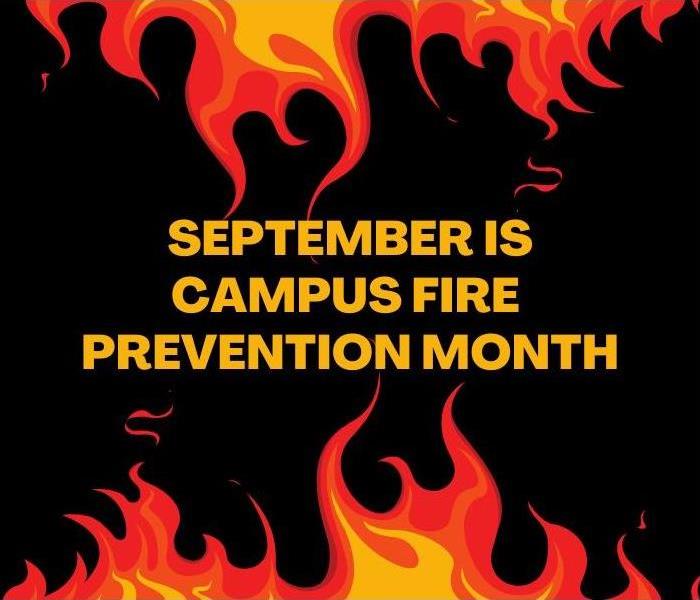 September is Campus Fire Safety Month! Spend some time this month by focusing on creating a fire-safe environment either on or off campus.
September is Campus Fire Safety Month! Spend some time this month by focusing on creating a fire-safe environment either on or off campus.
As September approaches, students are heading to college, so now is the perfect time to review best practices and learn how to put these practices into action for both students living on or off campus. Whether you are a student or parent, taking a few minutes to evaluate the new housing could go a long way toward preventing potential fire-related injury or deaths.
Click here to down the Campus Fire Safety Checklist for Students or click here for the Campus Fire Safety Tips for Parents.
When you first move in to your new housing, analyze your surroundings. Take time to educate yourself and your roommates about fire safety can make all the difference in a life-or-death situation. Taking small steps in identifying two ways out of a room, ensuring smoke and carbon monoxide detectors are properly installed and working can go a long way toward preventing potential fire-related injury or deaths.
Listed below are some simple things to evaluate for fire safety measures for campus-related housing:
- Keep combustible items away from heat sources.
- Smoking, candles, and other open flame items should never be used in student housing.
- Fire sprinklers control a fire and provide lifesaving time for escape.
- Know and practice the building’s evacuation plan, as well as alternate routes. Create and practice a fire escape plan, if living off campus.
- Ensure smoke alarms are installed in all sleeping areas, test smoke alarms monthly in an apartment or a house.
- Never remove or disable smoke alarms.
- Keep common areas and hallways free of possessions and debris, and never block exit routes.
What are some common causes of fires for college students?
There are several common causes for fires in dorms and off campus housing, including cooking, candles and overloaded power strips.
Follow these simple tips from the U.S. Fire Administration to avoid fires in campus housing:
Cooking
- Cook only where it is allowed.
- Keep your cooking area clean and free of anything that can burn.
- Keep an eye on what you are cooking, especially if you are cooking at high temperatures.
- If a fire starts in a microwave, keep the door closed and unplug the unit.
Electrical safety
- Keep lamps, light fixtures, and light bulbs away from anything that can burn.
- Never use an extension cord with large appliances, like a refrigerator.
- Do not overload outlets.
- Use only surge protectors or power strips that have internal overload protection.
We know how exciting it is to make the transition from home to college and we want you to stay safe, so we hope you share this information with friends in dorms and off campus. Don’t forget to check with your school’s individual fire safety plans.
As a certified fire restoration company in New Jersey, SERVPRO of Jackson/Lacey pledges our commitment to serving local colleges and the surrounding communities. We’re proud to provide the best emergency fire restoration services in Ocean, Monmouth, Middlesex, Mercer, Atlantic and Burlington Counties.
Fire Prevention for Your Jackson Restaurant
6/8/2022 (Permalink)
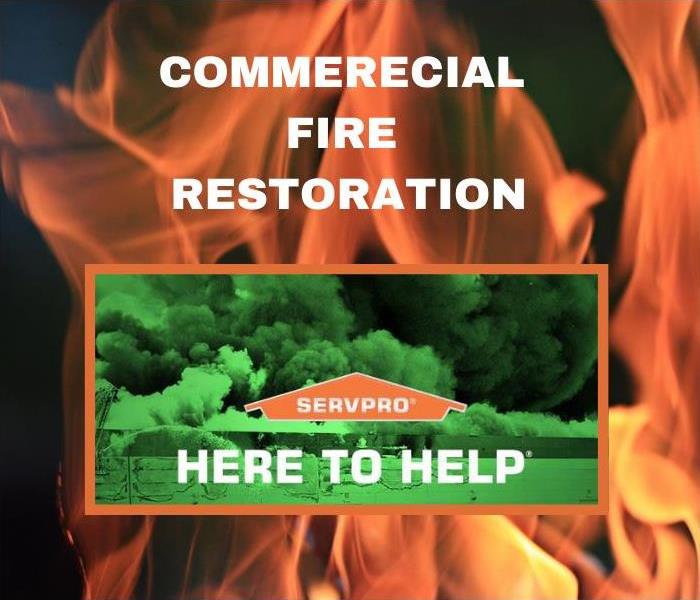 Commercial Fire Damage? Call Us Today at (732) 523-4986.
Commercial Fire Damage? Call Us Today at (732) 523-4986.
Understanding fire hazards at your Jackson restaurant kitchen can help minimize the risk of can help prevent injury or loss of life, property damage and business shutdown which could cause a loss of revenue.
Do you know the most common causes of restaurant fires?
- Open flames are a risk because many things within the kitchen can catch fire from them. The staff should be experienced in controlling open flames and know how a fire suppression system works in the event a fire were to start. An automatic fire suppression system is a system in the kitchen is one of the best preventative measures available. According to NFPA, more than half of restaurant fires involve cooking equipment. Fire suppression systems automatically release fire retardant materials when triggered. Once activated, the system automatically shuts off the fuel or energy supply to the cooking system.
- Grease and grease traps Grease can get hot and is extremely flammable. A full grease trap that is not cleaned regularly may have pieces of food that can easily catch fire when more hot grease is added.
- Flammable materials such as loose fitting or flammable clothing, dish towels and pot holders Make sure everyone in the kitchen has safe and proper attire while in the cooking areas. Also, make sure to keep all dish towels and pot holders away from an open flame.
- Electrical wiring Just a small tear, fray or, cut in a wire can lead to a fire in your kitchen so remember to check for frays, breaks, or damage, even those that are out of sight.
- Smoking If the staff is allowed to smoke, ensure they have a designated smoking area with disposal bins that are regularly checked and cleaned out.
Remember: The best defense against fire loss is to minimize the risk before a fire breaks out. One of the most accessible strategies for fire prevention involves good housekeeping.
What Can Owners, Managers and Employees Do to Help Prevent a Restaurant Fire?
- Train employees on fire extinguisher use/fire submission Train all employees how to properly use a fire extinguisher and activate the overhead fire suppression system, so in the event of a fire, they will know what to do.
- Back up extinguishers: Install back up extinguishers in your restaurant. Extinguishers in the cooking area should be Class K for use on high-temperature grease fires. Use them only after the built-in suppression system is activated. Use Class ABC extinguishers in other areas of the restaurant to deal with fires resulting from other materials such as electrical issues, paper, plastic, or wood. Fire extinguishers are helpful only when staff is trained on their proper use. Staff should know where the extinguishers are located and exactly how to operate one.
- Empty grease traps regularly Overfilled grease traps can catch fire.
- Keep aisles uncluttered Cluttered walkways will hamper employees and customers trying to escape from a fire.
- Turn off gas and electric source Employees should know where and how to cut off the gas and electrical source in case of an emergency ONLY IF SAFE!
- Provide sufficient lighting/make sure exit signs are functioning The emergency exit route needs to be adequately lit so employees and customers can see where they are going in case of an emergency and allows everyone to quickly identify the exit in an emergency.
During a four-year study by the National Fire Protection Association (NFPA), there were 7,640 structural fires in dining and drinking establishments. These fires caused more than $246 million in property damage.
The best strategy to protect your restaurant from a fire loss includes fire prevention and proper training for employees. If your Jackson restaurant experiences fire damage, SERVPRO of Jackson has the training, experience, and equipment to handle large commercial fire damage emergencies. Whether your fire emergency occurs in a restaurant, motel, or office building, we will respond quickly to mitigate the damage and manage the restoration project through to its completion.
If your Jackson business has fire, smoke or soot damage, call SERVPRO of Jackson/Lacey today. Our technicians have the training, experience, and equipment to handle large commercial fire damage emergencies.

 24/7 Emergency Service
24/7 Emergency Service








